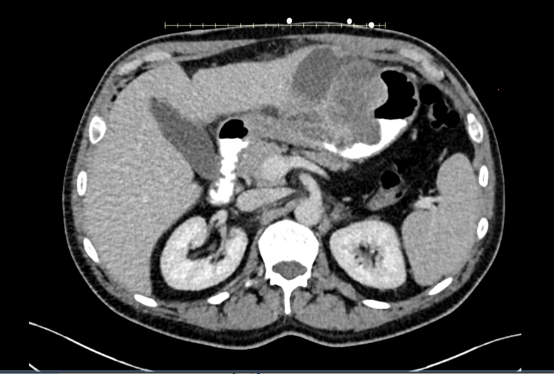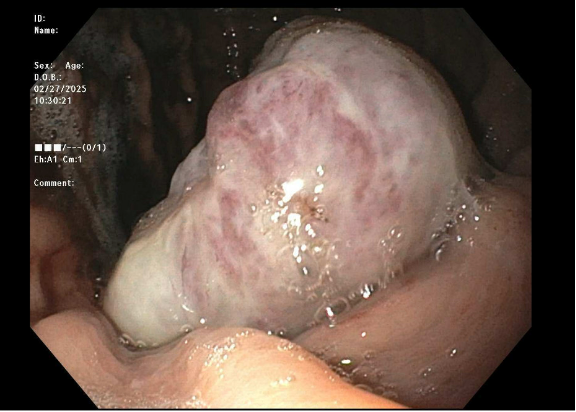Tuesday Poster Session
Category: GI Bleeding
P5272 - An Uncommon Malignancy Behind Common Symptoms: Gastric Sarcomatoid Carcinoma With Recurrent Bleeding
Tuesday, October 28, 2025
10:30 AM - 4:00 PM PDT
Location: Exhibit Hall
.jpeg.jpg)
Pitambar Khanal, MBBS (he/him/his)
Corewell Health William Beaumont University Hospital
Royal Oak, MI
Presenting Author(s)
Pitambar Khanal, MBBS1, Sant K. Yadav, MBBS1, Fady Banno, MD2
1Corewell Health William Beaumont University Hospital, Royal Oak, MI; 2Carewell Health William Beaumont Hospital, Royal Oak, MI
Introduction: Gastric sarcomatoid carcinoma (SC) is an extremely rare malignancy with a poor prognosis, and only a few cases have been reported in the literature. We present a case of gastric SC presenting with recurrent gastrointestinal (GI) bleeding, emphasizing the importance of early endoscopic evaluation in patients with GI bleeding.
Case Description/
Methods: A 50-year-old man presented with a three-week history of epigastric pain and melena. Initial lab showed hemoglobin of 8 g/dL. A CT scan of the abdomen demonstrated a 10 × 7.5 cm heterogeneous mass along the greater curvature of the stomach (Figure 1). Upper endoscopy revealed a fungating gastric mass with signs of recent bleeding (Figure 2). Biopsy confirmed the diagnosis of gastric SC. Surgery was deferred due to tumor extension into the left lobe of the liver and anterior abdominal wall, as seen on MRI. The patient began chemotherapy with 5-fluorouracil, leucovorin, oxaliplatin, and docetaxel, but the regimen was changed to palliative radiation and chemotherapy with carboplatin and paclitaxel after evidence of disease progression. He subsequently required palliative embolization of the left gastric and gastroepiploic arteries to manage recurrent GI bleeding. Despite treatment, the tumor progressed rapidly, leading to a gastrocutaneous fistula, severe malnutrition, and the patient’s transition to hospice care.
Discussion: Gastric SC is an exceedingly rare and aggressive malignancy characterized by a combination of malignant epithelial and mesenchymal cells. It is marked by rapid progression and early spread to adjacent organs and locoregional lymph nodes. Early endoscopic evaluation with biopsy and immunohistochemistry is critical for accurate diagnosis. While radical surgical resection remains the mainstay of treatment, however advanced stage at presentation often renders it unresectable. Although certain chemotherapies have shown benefits in non-gastric SC (e.g., carboplatin, paclitaxel, and bevacizumab for pulmonary SC), their effectiveness in gastric SC remains unclear. Recent studies have reported improved survival with immunotherapy in patients with SC of unknown primary, suggesting potential utility in gastric SC as well. Given the limited effectiveness of conventional therapies, early molecular profiling may help identify actionable mutations and guide targeted immunotherapy. Due to its rarity, more research is needed to explore it precise histogenesis, optimal treatment strategies and the role of immunotherapy and targeted agents.

Figure: Figure 1: Heterogenous stomach mass with cystic left hepatic lesion

Figure: Figure 2: Fungating mass in the greater curvature of the stomach
Disclosures:
Pitambar Khanal indicated no relevant financial relationships.
Sant Yadav indicated no relevant financial relationships.
Fady Banno indicated no relevant financial relationships.
Pitambar Khanal, MBBS1, Sant K. Yadav, MBBS1, Fady Banno, MD2. P5272 - An Uncommon Malignancy Behind Common Symptoms: Gastric Sarcomatoid Carcinoma With Recurrent Bleeding, ACG 2025 Annual Scientific Meeting Abstracts. Phoenix, AZ: American College of Gastroenterology.
1Corewell Health William Beaumont University Hospital, Royal Oak, MI; 2Carewell Health William Beaumont Hospital, Royal Oak, MI
Introduction: Gastric sarcomatoid carcinoma (SC) is an extremely rare malignancy with a poor prognosis, and only a few cases have been reported in the literature. We present a case of gastric SC presenting with recurrent gastrointestinal (GI) bleeding, emphasizing the importance of early endoscopic evaluation in patients with GI bleeding.
Case Description/
Methods: A 50-year-old man presented with a three-week history of epigastric pain and melena. Initial lab showed hemoglobin of 8 g/dL. A CT scan of the abdomen demonstrated a 10 × 7.5 cm heterogeneous mass along the greater curvature of the stomach (Figure 1). Upper endoscopy revealed a fungating gastric mass with signs of recent bleeding (Figure 2). Biopsy confirmed the diagnosis of gastric SC. Surgery was deferred due to tumor extension into the left lobe of the liver and anterior abdominal wall, as seen on MRI. The patient began chemotherapy with 5-fluorouracil, leucovorin, oxaliplatin, and docetaxel, but the regimen was changed to palliative radiation and chemotherapy with carboplatin and paclitaxel after evidence of disease progression. He subsequently required palliative embolization of the left gastric and gastroepiploic arteries to manage recurrent GI bleeding. Despite treatment, the tumor progressed rapidly, leading to a gastrocutaneous fistula, severe malnutrition, and the patient’s transition to hospice care.
Discussion: Gastric SC is an exceedingly rare and aggressive malignancy characterized by a combination of malignant epithelial and mesenchymal cells. It is marked by rapid progression and early spread to adjacent organs and locoregional lymph nodes. Early endoscopic evaluation with biopsy and immunohistochemistry is critical for accurate diagnosis. While radical surgical resection remains the mainstay of treatment, however advanced stage at presentation often renders it unresectable. Although certain chemotherapies have shown benefits in non-gastric SC (e.g., carboplatin, paclitaxel, and bevacizumab for pulmonary SC), their effectiveness in gastric SC remains unclear. Recent studies have reported improved survival with immunotherapy in patients with SC of unknown primary, suggesting potential utility in gastric SC as well. Given the limited effectiveness of conventional therapies, early molecular profiling may help identify actionable mutations and guide targeted immunotherapy. Due to its rarity, more research is needed to explore it precise histogenesis, optimal treatment strategies and the role of immunotherapy and targeted agents.

Figure: Figure 1: Heterogenous stomach mass with cystic left hepatic lesion

Figure: Figure 2: Fungating mass in the greater curvature of the stomach
Disclosures:
Pitambar Khanal indicated no relevant financial relationships.
Sant Yadav indicated no relevant financial relationships.
Fady Banno indicated no relevant financial relationships.
Pitambar Khanal, MBBS1, Sant K. Yadav, MBBS1, Fady Banno, MD2. P5272 - An Uncommon Malignancy Behind Common Symptoms: Gastric Sarcomatoid Carcinoma With Recurrent Bleeding, ACG 2025 Annual Scientific Meeting Abstracts. Phoenix, AZ: American College of Gastroenterology.
